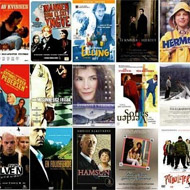 Less than 18 months since its original launch in 2014 and the controversial Popcorn Time software is still making headlines. The application’s colorful and easy to use interface has proven a hit with users and now anti-piracy groups in the United States and Europe are fighting back.
Less than 18 months since its original launch in 2014 and the controversial Popcorn Time software is still making headlines. The application’s colorful and easy to use interface has proven a hit with users and now anti-piracy groups in the United States and Europe are fighting back.
Last month Norwegian anti-piracy group Rettighets Alliansen (Rights Alliance) blamed Popcorn Time for a piracy explosion in the country and warned that it was monitoring pirates. More information is now being made available.
Norway has a population of just over 5.1m and it’s estimated that around 750,000 obtain video from illegal sources. However, it’s now being claimed that a third of those – 250,000 – are using Popcorn Time on a weekly basis. Rights Alliance says it has been watching them closely.
According to Rights Alliance chief Willy Johansen, his organization is now in possession of database containing information on between 50,000 and 75,000 suspected Popcorn Time pirates. The only question now is what the group will decide to do with the data.
“We are sitting today with a record of some users of [Popcorn Time] in Norway. These are records we can lawfully use, and it could be that someone gets a little surprise in the mail in the form of a letter. It’s probable that something will happen in the fall,” Johansen says.
If Rights Alliance follows through with its threats it will mark the first time that regular users have been targeted since copyright law was tweaked two years ago.
In 2013 a change in legislation enabled copyright holders to apply to the government for permission (granted to the Hollywood in Nov 2013) to scan file-sharing networks for infringements. Other changes mean that harvested IP addresses can now be converted to real-life identities with the help of the courts and ISPs.
But according to Bjørgulv Vinje Borgundvåg at the Ministry of Culture, yet more changes could be on the way.
“Two years ago, Parliament adopted an amendment providing Rights Alliance and the people who own these intellectual property rights to take action, and to ask the court for compensation for abuse of their intellectual property. We are now considering making further legislative changes to protect intellectual property from being abused online,” Borgundvåg told NRK.
In the meantime, however, groups like Rights Alliance, the MPA and their Hollywood affiliates have to deal with the law as it stands today. They have been granted permission to harvest IP address information by the country’s Data Inspectorate but obtaining the identities behind those addresses will require further work.
“In relation to the legislation we have in Norway, Rights Alliance is fully entitled to collect IP addresses of Popcorn Time users. This is not problematic as we see it,” explains Inspectorate Director Bjorn Erik Thon
“Rights Alliance may collect IP addresses, but to find out the identities of who is behind them requires a trial,” he notes.
However, according to law professor Olav Torvund, even getting that far is likely to provide headaches.
“This is not straightforward,” Torvund explains.
“Rights Alliance must determine which IP addresses have been used. Most Norwegian users have [regularly changing] dynamic IP addresses which do not necessarily identify the user.”
And even if users are successfully identified, legal problems persist.
“One must have acted intentionally or negligently and known or understood that material is being shared with others [when using Popcorn Time],” Torvund says
“It is not necessarily so easy to prove. In other words, it’s a long way to the finish and there are several problems to overcome.”
While Rights Alliance are known to go after both site owners and users elsewhere in Scandinavia (there were arrests in Denmark last week), it seems unlikely that they will take a troll-like stance with Popcorn Time users in the way that the makers of Dallas Buyers Club have.
Still, the fall isn’t too far away, so time will soon tell.





